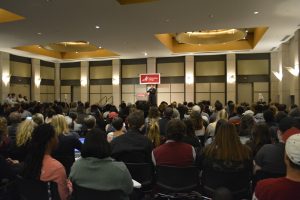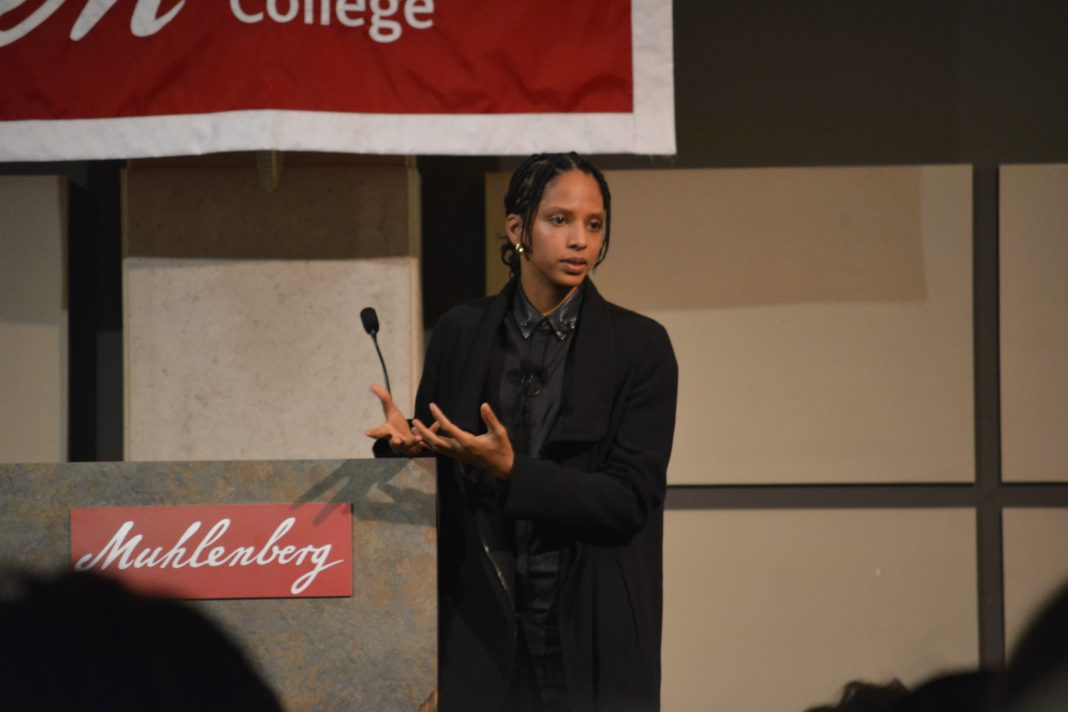On Monday evening, in the wake of the deadly mass shooting in Las Vegas and President Donald Trump’s opposition to the actions of National Football League players, Janaya Khan presented a talk entitled “Black Lives Matter: Demanding Social Transformation, Justice & Equality.” Khan was popular among students, faculty, staff and alumni, who packed so tightly into Miller Forum that overflow chairs were plucked from the surrounding classrooms and remaining attendees resorted to standing on the perimeter or sitting on the floor.
Khan is the co-founder of Black Lives Matter Canada, quickly becoming a strong voice in the internationally recognized campaign. According to Khan’s website, they are “a Black, queer, gender-nonconforming activist, staunch Afrofuturist, boxer and social justice educator.”
But the talk, which was part of the Center for Ethics series “Troubling Truth,” was about more than just the Black Lives Matter movement or queer politics. In just under two hours, Khan managed to speak about the Las Vegas shooting, what truth and the self really is, activism at its root, white supremacy, the Trump administration and so much more.
Khan opened with a simple question: “How do I make this meaningful when it feels like the world, at least the United States, is ending?” A tough question to answer, but one that needed to be answered before the real discussion could begin, as the issue looming over everyone’s head was what had happened Sunday night in Nevada. After touching upon the unfortunate elephant in the room, Khan delved into the first concept — what truth is.
According to Khan, the world we live in is a fast food, instant coffee age of information where people do not verify what is true with research. The idea of truth that Khan spoke to is “complicated” right now, arguing whether something was truth simply because people believe it and that it has now become people’s responsibility to figure out what is truth.
Almost as quickly as the issue of truth was discussed, Khan moved on to the issues surrounding white privilege, or rather, white supremacy.
“I want us to talk about what is actually happening and I want us to be brave about it. Because what we’ve been doing, it’s not working. The way that we talk around things, the way that we talk about white privilege but we don’t talk about white supremacy, it’s actually debilitating our ability to change things.”
Khan argued that most people aren’t having these types of conversations in the first place, at least the ones that need to, and, on top of that, most people aren’t in groups of people different than themselves – whether in race, religion, political views, etc.
“The greatest indicator of who was going to vote for Trump and who voted for Trump, beyond race, beyond gender, beyond class was zip code. You know what that tells me? It’s not just about what we stand for, it’s who we sit with. I think we can all agree, white supremacy is a bad thing. If you don’t you’re in the wrong room.”
Most powerful among Khan’s statements on white privilege and supremacy was this: “Something’s been nagging me and I wanted to bring it up. When you think about the Confederate South, one of those things that comes to mind is those images of people dressed in their Sunday best standing in front of a camera smiling while black bodies hung from trees. What if we’re those people? You know how we look back on them and say how could they have let that happen? What if lynches were traded for bullets and mass incarceration and slavery actually just mutated into the prison industrial complex, and we actually see black bodies on the pavement and still don’t respond? What if this generation is exactly the same except the tactics are different? We’re really good at looking back. We’re not so good at looking at now.”
One of the most important takeaways from Khan’s perspective on privilege was how it they contextualized it as not a sense of what is yours but rather what you haven’t had to go through. Khan argued that instead of listening to others and comparing whose struggles are worse, see the connectedness of it instead. Khan supported that belief by explaining that people have begun to know a lot about each other without spending a lot of time together – an issue of reinforced stereotypes that allow individual truths to inform collective truths.
It’s not just about what we stand for, it’s who we sit with. I think we can all agree, white supremacy is a bad thing. If you don’t you’re in the wrong room.”
The discussion morphed back to the attack in Las Vegas, but also to the recent natural disasters that hit Texas, Florida and, most recently, Puerto Rico.
“I guess with Puerto Rico you can say that only some Americans matter. I guess with Black people too, and black people in general, only some matter.”
While Khan touched on endless societal issues in the discussion, it was the advice on activism that left attendees with at the end that stuck.
“I don’t need all of you to be activists, I just need you to be active. If you don’t know how to disprove something, dispute it. When you don’t know what to do, do what you know but don’t do nothing, nothing cannot be an option. We don’t get to ask how did this happen because instead we must be asking what can I do about it.”
But possibly the most powerful quote of the evening, and one that clearly resonated well with those in the audience, was Khan’s fiery opposition to the way those in the Black Lives Matter movement in the world have been perceived.
“I’ll tell you there is something terrifying in this country and that is black leadership; there has not been one black leader that hasn’t had an FBI file in this country, not one. There is something about leadership that looks like this,” Khan said, circling their face with their finger, “that is so terrifying in fact that a movement that is largely led by women, by queer and trans people and by disabled people and a movement of people that look like me, we are called terrorists though we’ve never bore arms.”
The overwhelming turnout and support for Khan by current Muhlenberg students would have been expected, with peaking interest in social justice over the past few years. However, dozens of alumni voiced their on a Facebook post promoting the event – including phrases like “this school disgusts me… that you would open your doors to filth like this is disgusting” and “was such a great college once. sorry it has fallen so far.”
Not all alumni echoed this sentiment, with some responding in support. One in particular who travelled from Rhode Island just for Khan’s talk, stood up and made sure to clarify that not all alumni thought the same.
“I just want to say how wonderful it is to have you here. I can’t be more proud of Muhlenberg for bringing you here. I am a white male, grew up in a white family in a white town, and it is important, it is good work and it makes us better people.”
Khan was an important speaker on campus; some may argue necessary. With the current unrest in the country, and a campus where racially fueled incidents have made students of color feel unsafe, speakers like Khan that argue for activism but also inclusiveness have the ability to spark needed conversations and action.

Although Khan’s talk ended positively with a call to action, the on campus reaction in the late evening or early morning hours turned negative.
Flyers claiming to be from the “Alternative Center for Ethics” were posted across campus arguing against the foundations of the Black Lives Matter movement. Under headings such as “police killings” and “black crime,” the flyer stated that “blacks are disproportionately killed by the police but they also are even more disproportionately responsible for violent crime.”
Furthermore, the flyer was labeled “Alternative Troubling Truth #1,” which implies that there may be more flyers posted around campus.
Tuesday afternoon, another flyer labeled “Truth to Power” began circulating around campus in response to the original flyer. This one stated that “when we say Black Lives Matter, we are broadening the conversation around state violence to include all of the ways in which Black people are intentionally left powerless at the hands of the state. We are talking about the ways in which Black lives are deprived of our basic human rights and dignity,” which is pulled from the Black Lives Matter website.
President Williams responded late Tuesday evening via email, stating that he was “deeply disturbed” that the conversations Khan had begun had devolved into hateful and disrespectful interactions through the distribution of these anonymous flyers, as well as on the College’s social media.
Williams also affirmed the idea that Muhlenberg is committed to the promotion of free speech, aiming to create “independent critical thinkers with a zest for reasoned and civil debate and who are equipped with ethical and civic values.”
Future discussions in the Center for Ethics series “Troubling Truth” will cover topics such as transgender issues, religion, politics, and concludes with a performance of “Dreamscape” on Nov. 17. The play addresses the negative role polic- ing and surveillance has played in communities of colors.
Alyssa Hertel was the Managing Editor of The Muhlenberg Weekly. She graduated with a degree in Media & Communication with double minors in Creative Writing and International Relations. An avid fan of perfectly average sports teams, she is pursuing a career in journalism focusing in sports.























As an alum and now a father of a currently enrolled student, I am glad such voices are finding their way on campus. Wish I could have attended.